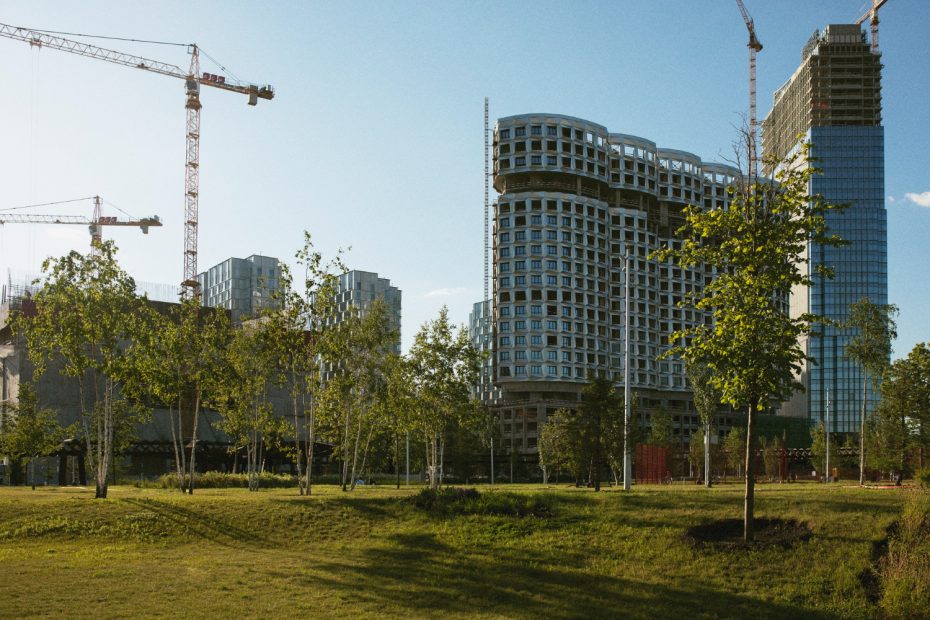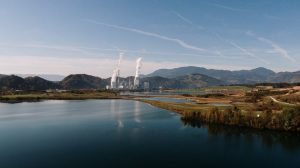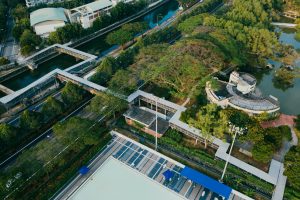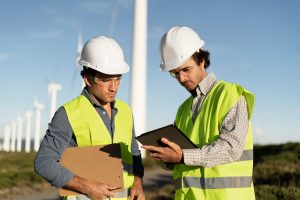Industrial growth in Indonesia continues to rise, especially in the manufacturing and production sectors. However, this development brings new challenges: how to build industrial facilities that are both efficient and environmentally friendly. Eco-friendly factory construction services with modern technology have emerged to meet this need.
This concept combines sustainable design, efficient energy management, and the application of the latest construction technologies. Modern factories focus not only on production capacity but also on reducing environmental impact, long-term cost efficiency, and creating a comfortable working environment.
This article discusses why eco-friendly factory construction are important, the modern technologies used in construction, and steps to choose the right construction services.
Why Are Eco-friendly factory construction Increasingly Needed?
1. Environmental Impact of Conventional Factories
Conventional factories often produce excessive waste, air pollution, and high energy consumption. Poorly managed liquid and solid waste can contaminate soil and water sources, while emissions from production processes increase air pollution. Factories that are inefficient in energy use contribute to higher operational costs and increase the company’s carbon footprint.
By transitioning to Eco-friendly factory construction services, companies can minimize these negative impacts through effective waste management, renewable energy use, and efficient production systems.
2. Government Regulations
The Indonesian government enforces various environmental regulations, including waste management, gas emissions, and energy use. Factories that do not comply with these standards risk legal sanctions or heavy fines.
Following these regulations not only protects companies from legal risks but also creates more organized, measurable, and sustainable operations. This is one reason why using eco-friendly factory construction services is crucial.
3. Global Market Demands
In the era of globalization, consumers and business partners are increasingly concerned about sustainability practices. Products produced in Eco-friendly factory construction services are better accepted and trusted in the market, as they are considered ethical and responsible.
Companies that meet environmental standards not only gain consumer trust but also open up broader export opportunities to international markets with strict environmental regulations.
4. Resource Efficiency
Eco-friendly factory construction services are designed to maximize resource utilization, from energy and water to production materials. Efficient production systems reduce waste, lower operational costs, and extend equipment lifespan.
With resource efficiency, companies can operate more economically while minimizing negative environmental impacts, making factories more sustainable and competitive in the long term.
5. Consumer and Public Awareness
Society today is increasingly aware of environmental and sustainability issues. Companies that build Eco-friendly factory construction services are more likely to gain public support, consumer loyalty, and a positive media image.
Consumer awareness drives companies to adapt and implement sustainable practices in their production processes, including eco-friendly factory construction.
6. Innovation and Competitive Advantage
Applying modern technology in eco-friendly factory construction promotes innovation in design, production processes, and operational management. Efficient and sustainable factories provide companies with a competitive advantage, offering high-quality products at lower costs with minimal environmental footprint.
Through this innovation, companies not only comply with regulations and market demands but also become pioneers in sustainable industrial practices.
Modern Technologies in Eco-Friendly Factory Construction
1. Energy-Efficient Design
Modern factory design uses Building Information Modeling (BIM) technology to create efficient layouts. BIM allows for calculations of natural lighting, ventilation, and optimal machine placement to reduce energy consumption.
Energy-efficient design also considers building orientation toward sunlight, insulated glass usage, and LED lighting systems to reduce electricity needs and increase operational cost efficiency.
2. Eco-Friendly Materials
Eco-friendly factory construction materials are increasingly popular due to their low environmental impact. Examples include recyclable lightweight steel, low-carbon concrete, and non-toxic paints and insulation.
These materials not only reduce environmental impact but are usually more durable and require minimal maintenance. Choosing the right materials can enhance construction efficiency while supporting sustainable development.
3. Renewable Energy Systems
Renewable energy applications, such as solar panels, wind turbines, and biomass-based heating systems, are key strategies to reduce reliance on fossil fuels. These systems help lower electricity costs and reduce the carbon footprint.
Integration with smart grids and IoT-based monitoring allows companies to manage energy consumption in real time, making factory operations more efficient and environmentally friendly.
4. Water and Waste Management
Modern technologies enable effective treatment of liquid and solid waste. Water treatment systems can recycle water for production or sanitation, while zero-waste technologies minimize waste disposal into the environment.
Proper waste management not only protects the environment but also meets legal requirements and improves corporate image. It also supports operational efficiency, as recycled waste can become an additional resource.
5. Automation and Internet of Things (IoT)
IoT enables real-time monitoring of machinery conditions, energy usage, room temperature, and ventilation systems. With instant data, management can make quick adjustments to reduce energy waste and improve production efficiency.
Automated production processes also help reduce human error, increase productivity, and optimize energy and material usage.
Benefits of Choosing Eco-Friendly Factory Construction Services
1. Operational Cost Efficiency
Eco-friendly factory construction services require higher initial investment, but using renewable energy, durable materials, and effective waste management systems can significantly reduce operational costs in the long term.
With careful planning and modern technology, routine expenses for electricity, water, and maintenance can be minimized, allowing the initial investment to pay off through operational cost efficiency.
2. Regulatory Compliance
Experienced construction services ensure your factory complies with all environmental regulations, from national to international standards. Compliance protects companies from legal risks and strengthens their position in the eyes of investors and business partners.
Professional services can also help companies obtain environmental certifications that enhance reputation and business credibility.
3. Improved Corporate Reputation
Eco-friendly factory construction services reflect a company’s responsibility toward society and the planet. This positive image increases trust among consumers, investors, and business partners and adds value to corporate branding strategies.Strong environmental credibility also facilitates long-term collaborations with clients and international partners.
4. Access to International Markets
Products from Eco-friendly factory construction services are more easily accepted in global markets that prioritize sustainability standards. This opens up export opportunities and enhances the company’s competitiveness.
Compliance with international standards also simplifies product certification processes and meets environmentally conscious market demands.
5. Healthier Work Environment
Modern factories focus on proper air circulation, natural lighting, and ergonomic workspaces. A healthy work environment improves employee comfort and productivity while reducing health risks from pollution or poor ventilation.
Investing in ergonomic design and natural lighting positively impacts employee motivation and satisfaction, making factory operations more effective.
Steps to Build an Eco-Friendly Factory
1. Initial Planning
The first step in constructing an eco-friendly factory is careful initial planning. This involves consultation with construction consultants, feasibility studies, energy needs analysis, and selecting a strategic location.
Proper planning allows the company to design an efficient, energy-saving factory that complies with regulations. Additionally, this stage helps identify potential issues early, minimizing the risk of cost overruns or operational disruptions in the future.
2. Architectural & Engineering Design
Architectural and engineering design forms the foundation of an eco-friendly factory. Utilizing Building Information Modeling (BIM) and modern design software allows optimal layout planning, including natural lighting, adequate ventilation, and healthy airflow circulation.
Efficient design not only reduces energy consumption but also creates a comfortable and productive working environment for employees. Proper design also supports the maximum integration of eco-friendly technologies.
3. Material Selection
The materials used in factory construction significantly impact the environment and operational costs. Focus on eco-friendly, durable, and cost-effective materials such as recycled lightweight steel, eco-friendly concrete, and non-toxic paint.
Choosing the right materials helps minimize the carbon footprint, enhance construction quality, and ensure the factory can operate sustainably for many years.
4. Installation of Modern Technology
The installation stage involves applying solar panels, renewable energy-based heating or cooling systems, waste management systems, automation, and IoT for operational monitoring.
With these technologies, an eco-friendly factory can reduce energy consumption, monitor production processes in real-time, and manage waste and resources efficiently. Proper implementation makes the factory cost-effective and sustainable.
5. Audit and Certification
After construction, internal and external audits are necessary to ensure all systems operate according to environmental standards. The factory can also obtain green certifications, such as LEED or certification from the Green Building Council Indonesia.
Certification not only proves regulatory compliance but also enhances company reputation and public trust in its sustainability commitment.
6. Training and Workforce Preparedness
Once the factory is built, it is crucial to train staff and management to optimally use eco-friendly facilities. Training includes operating automation systems, energy monitoring, waste management, and safety procedures.
A skilled and environmentally aware workforce ensures the factory operates efficiently, maximizes modern technology, and minimizes operational errors.
7. Continuous Monitoring System
Eco-friendly factory construction does not stop after completion. Continuous monitoring systems are required to track energy consumption, emissions, water usage, and waste in real-time. Advanced IoT and sensors allow quick production adjustments, ensuring the factory remains efficient, energy-saving, and environmentally compliant at all times.
8. Routine Maintenance and Repairs
The final step is routine maintenance of equipment, infrastructure, and technological systems. Maintenance includes checking solar panels, ventilation, production machinery, and waste treatment facilities.
Regular maintenance keeps the factory’s performance optimal, prevents damage, and ensures operations remain efficient and sustainable.
How to Choose the Right Construction Services
-
Experience with Green Projects – Ensure the contractor has a proven track record in eco-friendly factory construction and is proficient in modern technology.
-
Certified Experts – Architects, engineers, and consultants should have relevant certifications and experience in green construction standards.
-
Commitment to Innovation – Contractors must follow the latest technological developments and implement efficient solutions.
-
Cost Transparency – Provide clear budget breakdowns, including initial investment and long-term savings estimates.
-
After-Sales Support – Maintenance and monitoring services after construction to ensure ongoing efficiency and sustainability.
Challenges in Eco-Friendly Factory Construction
1. Higher Initial Costs
One of the main challenges is the relatively high initial investment. Modern technologies, eco-friendly materials, and renewable energy systems require larger upfront capital than conventional factories.
However, despite high initial costs, long-term benefits are far more significant. Eco-friendly factory construction services can save energy, reduce waste, lower operational costs, and improve production efficiency. With proper planning, the investment returns through sustainable savings while enhancing company value in the eyes of consumers and investors.
2. Limited Expert Availability
Not all contractors or workers are skilled in eco-friendly factory construction. Sustainable factory construction requires expertise in energy-efficient design, IoT integration, renewable energy systems, and effective waste management.
Limited expertise can become a barrier if the company is not selective in choosing construction services. Working with experienced contractors who understand green building principles and can correctly apply modern technology is essential.
3. Lack of Corporate Awareness
Some companies still prioritize low costs over sustainability, viewing eco-friendly factory construction as an unnecessary expense. This lack of awareness often hinders strategic decisions for long-term investment.
Education on the benefits of eco-friendly factory construction such as energy savings, regulatory compliance, improved corporate reputation, and global market access is necessary to overcome this challenge.
4. Complex Technology Integration
Implementing modern technologies like automation, IoT, and renewable energy requires proper integration with existing factory infrastructure. This complexity poses risks if the construction team lacks experience, including installation errors or operational disruptions.
The solution is to work with professional construction services experienced in eco-friendly factory projects with complex modern technology integration.
5. Ongoing Maintenance
Eco-friendly factory construction requires regular maintenance to ensure energy systems, ventilation, solar panels, and waste treatment operate optimally. Without periodic maintenance, the factory risks reduced energy efficiency, operational disruptions, and increased repair costs.
Companies must schedule regular maintenance and have skilled personnel to manage modern technology systems to maintain sustainable and efficient operations.
6. Corporate Culture Adaptation
Transitioning to eco-friendly factory construction requires adapting corporate culture. Employees and management must become accustomed to new procedures, energy monitoring, waste management, and sustainable production practices.
Without internal support, eco-friendly systems may not function optimally. Education, training, and clear communication are vital for the team to understand the long-term benefits of sustainable factory construction, ensuring maximum effectiveness.
Strategies to Overcome Challenges
1. Partnership with Experienced Contractors
Choosing professional and experienced eco-friendly factory construction services is crucial. Contractors skilled in modern technology, energy-efficient design, and waste management systems ensure projects meet standards, are efficient, and sustainable.
Proper partnerships minimize installation errors, additional costs, and operational disruptions, keeping the project on track.
2. Government Support and Incentives
Government programs support green construction, including tax incentives, technical assistance, and environmental certification. Companies utilizing these benefits can reduce initial investment costs and gain regulatory support.
Government support accelerates implementation while enhancing the company’s credibility with the public and investors.
3. Internal Education
The success of eco-friendly construction depends not only on technology but also on corporate awareness. Training management and staff in sustainable practices, energy efficiency, and waste management is crucial.
With proper understanding, the team follows eco-friendly procedures more consistently, improving operational effectiveness and minimizing errors.
4. Detailed Budget Planning
A well-planned budget should account for initial investment, operational costs, and long-term savings estimates. Proper planning balances upfront costs with energy efficiency benefits.
Accurate cost calculation reduces the risk of budget overruns and ensures the eco-friendly factory construction project is financially feasible.
5. Use of Monitoring Technology
Implementing IoT-based monitoring and advanced sensors allows companies to track energy consumption, emissions, and water usage in real-time. This enables quick production adjustments to maintain efficiency.
Continuous monitoring supports energy-saving operations and helps meet national and international environmental standards.
6. Maintenance and Care Training
Eco-friendly factory construction services require regular maintenance of renewable energy systems, solar panels, ventilation, and waste treatment. Training maintenance teams on the modern technologies used is essential.
Proper maintenance keeps factory performance optimal, reduces the risk of damage, and ensures operations remain efficient and sustainable.
7. Integrating a Sustainability Culture
Developing a corporate culture that supports sustainability helps all employees become accustomed to environmentally friendly practices. This strategy includes internal communication, reward programs for energy efficiency, and environmental awareness campaigns.
With a supportive culture, the implementation of eco-friendly factory construction becomes easier and more effective, and the entire team actively participates in preserving the environment.
Kesimpulan
Eco-friendly factory construction is not just a trend; it is a strategic necessity for companies seeking sustainability, efficiency, and competitiveness. By taking the right steps—from initial planning, architectural and engineering design, eco-friendly material selection, modern technology installation, audits and certification, workforce training, to continuous monitoring and routine maintenance—companies can ensure their factories operate optimally and sustainably.
Implementing eco-friendly factory construction not only helps reduce carbon footprint and energy consumption but also enhances corporate reputation, ensures regulatory compliance, and provides a competitive advantage in the global market. Investing in energy-efficient and sustainable factory development is a long-term strategic move that delivers operational, financial, and environmental benefits simultaneously.
With commitment, careful planning, and modern technology, every company can realize a productive, efficient, and environmentally friendly factory while maintaining a focus on sustainable business growth.
Do you want to build a modern, efficient, and eco-friendly factory and need an experienced contractor? Trust your project to us. We will help construct an eco-friendly factory using modern technology tailored to your company’s needs. Contact us now for a consultation and start making your dream factory—energy-efficient, sustainable, and innovative a reality!




